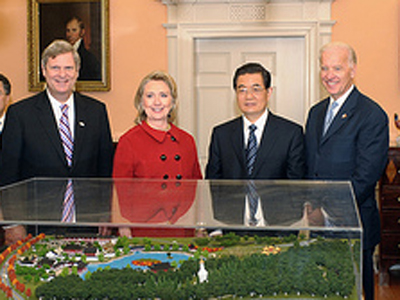Snub Diplomacy for Clinton?
What to make of China's presumptive next president canceling a meeting with the U.S. secretary of state.
 Sometimes a meeting gets canceled and people breathe a sigh of relief. But sometimes a meeting gets canceled and the whole world wonders why. That’s what happened when Secretary of State Hillary Clinton traveled to China this week and President Hu Jintao’s “heir apparent,” Xi Jinping, canceled their meeting.
Sometimes a meeting gets canceled and people breathe a sigh of relief. But sometimes a meeting gets canceled and the whole world wonders why. That’s what happened when Secretary of State Hillary Clinton traveled to China this week and President Hu Jintao’s “heir apparent,” Xi Jinping, canceled their meeting.
It isn’t easy to ascertain what this might mean, if anything. After all, Clinton did still manage to meet with President Hu, Premier Wen Jiabao and Chinese foreign minister Yang Jiechi. But, given that this probably will be Clinton’s last trip to Beijing as secretary of state, and Hu himself stated during their meeting that “China-U.S. relations have great strategic significance and global influence, and this is worth cherishing and protecting,” one might think that the individual touted to become the next president of China during the upcoming eighteenth party congress should have found the time to meet with her.
Before we hurl accusations and/or vitriol, however, we should note that it wasn’t only Secretary Clinton that Xi canceled on. According to reports, meetings with Singaporean prime minister Li Hsien-loong and a Russian parliamentarian were also canceled.
Thus, we can say that at least Secretary Clinton wasn’t being singled out.
There have been unconfirmed reports that Xi Jinping might be suffering from a back injury and didn’t want this ailment broadcast in the media during the lead-up to the historic power transition set to occur sometime in October or early November. Also, it should be noted that, when the Xi meeting was canceled, the Chinese scrambled to set up a meeting between Clinton and Vice Premier Li Keqiang, the man most people believe will take over Premier Wen Jiabao’s position this fall.
Later, during a news conference, Foreign Minister Yang tried to shut down the rumor mill that instantly started churning after news of Xi’s cancellation. “I hope people will not have unnecessary speculation,” he said. Wise words, but it begs the question of why this particular event is garnering so much attention? Is this a mere molehill built into a mountain?
The answer is probably yes and no.
Nobody in the United States really knows why this meeting was canceled, and perhaps we’ll never know. So many aspects of China’s elite politics are shrouded in opacity, especially during the lead-up to a once-a-decade power transition, that fixating on what may be a mere health development may be counterproductive.
That said, the reason this incident is so compelling is because U.S.-China relations have been traveling along a rocky road of late. That is reflected in the fact that Secretary Clinton’s Beijing trip did not bear much fruit. That may be the true story here.
Even before Clinton’s arrival, Global Times, an often hypernationalistic paper controlled by the Chinese Communist Party, ran an editorial that said in part: “Many Chinese people dislike Hillary Clinton.” And though senior-level Chinese politicians shied away from such personal jabs, the overall tenor of Clinton’s meetings was still strained. Premier Wen Jiabao urged the United States to respect Chinese sovereignty and territorial integrity. He candidly added, “Generally speaking, our relationship has been moving forward, but recently I am more or less worried.”
Some analysts, including the Council on Foreign Relations’ Elizabeth Economy, have written that lately it seems as if China believes all of its problems originate with the United States. What’s more, China continues to question the motives behind Obama’s “pivot” or “rebalance” to Asia and fears the emergence of a more overt U.S.-led containment strategy in the region. For example, Japan, a close U.S. ally, is actively pursuing territorial claims related to the long-standing dispute between China and Japan over the Diaoyu/Senkaku islands. A retired Chinese military officer, Xu Guangyu, said: “We feel there are too many different countries ganging up on us. The U.S. is playing the role of the aggressor here.”
It is important to remember that China, like the United States, is in an “election year” of sorts, which may account for the more stridently nationalistic or aggressive language coming out of Beijing as Chinese leaders approach their own power-transition process. Thus, it can be argued that what current and future administrations—as well as the American people—should be focused on is not necessarily an individual meeting, or a potential snub, but the overall health and stability of the U.S.-China relationship.
A. Greer Meisels is associate director and research fellow, China and the Pacific, at the Center for the National Interest.
Image: USDAgov
